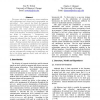Free Online Productivity Tools
i2Speak
i2Symbol
i2OCR
iTex2Img
iWeb2Print
iWeb2Shot
i2Type
iPdf2Split
iPdf2Merge
i2Bopomofo
i2Arabic
i2Style
i2Image
i2PDF
iLatex2Rtf
Sci2ools
HICSS
2003
IEEE
2003
IEEE
Internet Use, Transparency, and Interactivity Effects on Trust in Government
This paper asks how internet use, citizen satisfaction with e-government and citizen trust in government are interrelated. Prior research has found that agencies stress information and service provision on the Web (oneway e-government strategy), but have generally ignore applications that would enhance citizen-government interaction (two-way e-government strategy). Based on a review of the literature, we develop hypotheses about how two facets of e-democracy – transparency and interactivity – may affect citizen trust in government. Using data obtained from the Council on Excellence in Government, we apply a two stage multiple equation model. Findings indicate that internet use is positively associated with transparency satisfaction but negatively associated with interactivity satisfaction, and that both interactivity and transparency are positively associated with citizen trust in government. We conclude that the one-way e-transparency strategy may be insufficient, and that in the...
Biometrics | Citizen Trust | E-government Strategy | HICSS 2003 | System Sciences | Two-way E-government Strategy |
| Added | 04 Jul 2010 |
| Updated | 04 Jul 2010 |
| Type | Conference |
| Year | 2003 |
| Where | HICSS |
| Authors | Eric W. Welch, Charles C. Hinnant |
Comments (0)

